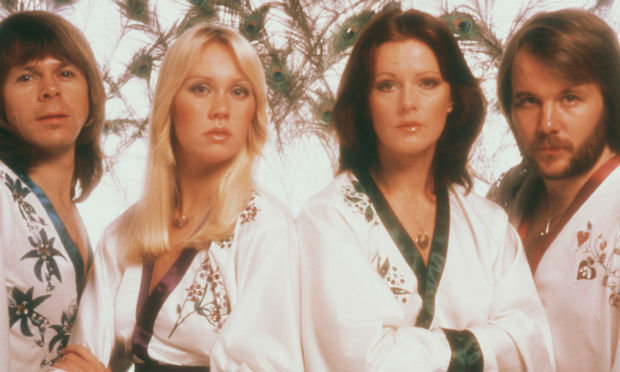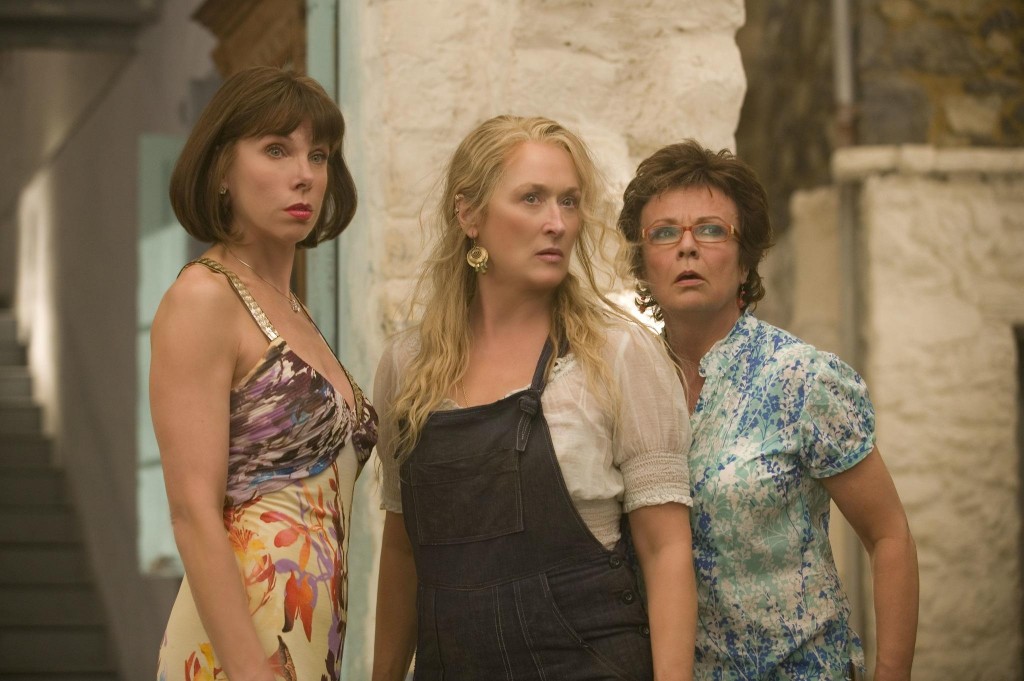The 10 best ABBA songs not to make the ‘Mamma Mia!’ films
Matthew Barton delves into ABBA's back catalogue to find the tracks which shoulda made the movies.
By Will Stroude

With the Mamma Mia: Here We Go Again upon us, a career-spanning exhibition at the Southbank Centre and, most exciting of all, two new songs due in December, it’s a pretty good time to be an ABBA fan.
News of the fresh material – ABBA’s first since 1982 – provoked squeals of delight and disbelief (Kate Bush live residency, you’ve got Unexpected Pop Moment of the Decade competition.)
Much will be made of them when they are finally unveiled, but for now we’d like to take this opportunity to look back (think Agnetha and Frida in the “Take a Chance on Me” video, winks to camera optional) at some of the more neglected chapters in ABBA’s Book of Pop Excellence.
Now we all know our ‘Dancing Queen’s from our ‘Fernando’s, and we’re well acquainted with our ‘Chiquitita’s and our ‘Super Trouper’s, but what about some of the hidden gems of ABBA’s considerable Scandi-canon? The side streets and hidden alleys the movies don’t tell you about?

If you’re a die-hard fan who owns about four versions of each remaster (not us, honest…) these songs will already be in your DNA. But for those who currently only know the hits (and that’s no bad thing) and want to dig a little deeper, here are ten songs that showcase ABBA’s awesome diversity – and prove that they were NOT just a singles band (the glistening pop bible that is ABBA Gold notwithstanding.)
Enjoy! And blame us not when the ABBA obsession takes hold. You’ve been warned!
‘Ring Ring (Svensk)’ (1973)
ABBA singing their songs in their native language is a particular joy. There’s something about the Scandinavian vowels and diction that feels innately jubilant and true; if you’ve ever heard Björk singing in Icelandic, you’ll know it can really hit you in the heart too.
1973’s ‘Ring Ring’ was ABBA’s first Eurovision attempt and frankly just as strong as the iconic ‘Waterloo’, which launched their career outside of Scandinavia. It’s a glorious, underrated 60s-inspired sliver of longing and uncertainty, the kind ABBA do best, and it’s pure fun to hear it in Swedish.
‘Dance (While the Music Still Goes On)’ (1974)
It is an incorrect point of view (there, I said it) that ABBA only really settled into their supreme pop smarts around the 1975/76 purple patch of ‘S.O.S.’, ‘Mamma Mia’, and ‘Fernando’.
Because Waterloo, recorded in the Swedish winter of 1973-74, features the magnificent ‘Dance (While the Music Still Goes On)’, which has all the yearning (a beautiful lead vocal from Agnetha), harmonies (hello there climactic key change), and emotive melodies that we associate with Peak ABBA.
It’s sublime heartbreak pop (“was it just a dream, everything we did? Everything we had?”) and bears the hallmarks of their ’60s Spector/Wall of Sound/girl group influence. Stunning.
Suzy-Hang-Around (1974)
If you come to ABBA for the beautiful harmonies of Agnetha and Frida, sometimes hearing Björn sing lead (‘Does Your Mother Know’, ‘Why Did It Have to Be Me’) can initially throw you. So what will you do when you hear beardy songwriter-keyboardist genius Benny take the reins? You can find out if you give ‘Suzy-Hang-Around,” the childhood lullaby that closes 1974’s Waterloo, a spin.
Give it time, and this insanely pretty folk song, with a lovely lilting melody, will worm its way into your heart. Spoiler: Benny has a lovely, no-frills, warm voice. Listen out for the harmonies at the end, which pre-Fleetwood Mac Fleetwood Mac (Lindsey and Stevie edition).
If It Wasn’t for the Nights (1978)
ABBA spent the mid-70s flying high with a series of multi-platinum hit singles and albums that perfectly captured the zeitgeist and, more than forty years later, stand the test of time. In something of a volte-face, 1979’s Voulez-Vous is jam packed with disco anthems, and ‘If It Wasn’t for the Nights’ may be the greatest of the lot.
Inspired by the success of the Bee Gees, ABBA decamped to the familiar surroundings of Stockholm’s Polar Studios and created a sleek late 70s masterwork. Their melodies shifted from the melancholy to the bold and swaggering, but this song marries both to disarming effect and its sense of loneliness predates fellow divorce ballad ‘The Winner Takes It All’.
File under: Should Have Been A Single.
‘Eagle’ (1977)
With 1976’s Arrival, ABBA became the true international pop behemoth that we know and love today. An album featuring ‘Dancing Queen’, ‘Knowing Me, Knowing You’, and ‘Money, Money, Money’ couldn’t really be anything other than a rocket into the pop stratosphere, could it?
So with the follow-up, 1977’s The Album, the group could afford to experiment a little further – and its sublime opener ‘Eagle’ sets out its stall perfectly. A strange, beautiful concoction of synths, guitars, sumptuous harmonies, and more than a little prog-rock influence, ‘Eagle’ soars as high as its avian namesake would suggest.
The longest song they had put to record at this point by some margin, ‘Eagle’ is the thrilling sound of a band finding new depths and complexities in their core sound.
‘Me and I’ (1980)
1980’s Super Trouper is a mature affair that balances the more discofied influence heard on Voulez-Vous with the pop nous of ABBA’s mid-‘70s work.
‘Me and I’ introduces synth pop into the bargain, with blaring synthesisers and treated vocals providing the basis for this rolling jewel that features a nonchalant Eartha Kitt-inspired vocal performance by Frida.
The chorus is twinkly and catchy, and trust ABBA to find the common human ground in a song about split personalities.
‘The Piper’ (1980)
ABBA were always adept at throwing a curveball or two per album… Ring Ring has yodelling (‘People Need Love’), Arrival slips in a hymnal instrumental (the title track), and The Album ends on a three-part musical suite.
But by 1980, with their reputation secured, ABBA could afford to drop in a piece of music that is equal parts early 80s synth pop realness, haunting offbeat medieval calypso (listen out for the choral Latin chant – no, really), and skewed Irish jig.
It’s a bit creepy and a lot amazing, and in an alternate universe this would have been another hit from Super Trouper.
‘Elaine’ (1980)
Only ABBA would write a song with a lead protagonist called Elaine. Originally a b-side to ‘The Winner Takes It All’ in 1980, ‘Elaine’ is a fast-paced frenetic synthy gem with a warning lyric that belies its jauntiness.
It won’t win awards as ABBA’s best song, but it was both a remarkably breezy flipside to the magisterial ‘The Winner Takes It All’ and a reminder to listeners that even in their non-album tracks, ABBA showed a consistent commitment to pop excellence.
‘I Let the Music Speak’ (1981)
We all know now how Benny and Björn were incredible musical-makers; Chess remains a high point in their writing careers. But before then, their outlet was only occasional and through ABBA records.
1977’s The Album ended with the ‘Girl with the Golden Hair’ suite that hinted at this ambition, but ‘I Let the Music Speak’ from 1981’s The Visitors finds the musical gene in full bloom.
There’s so much to say about this masterwork – from the grandiose orchestral arrangement, the delicate transitions between the verses and the chorus, the soaring vocal by Frida – but taking a cue from the title, have a listen and let it speak for itself.
Soldiers (1981)
ABBA’s final studio album, 1981’s The Visitors, may be their most satisfying work. (Any of the reissues featuring the peerless ‘The Day Before You Came’, recorded the following year, as a bonus track is advisable.)
It’s a mature, elegant, but downbeat affair. Even the comparatively fun songs (‘Head Over Heels’, ‘Two for the Price of One’) have an underlying cynicism and despair. ‘Soldiers’ is one of the most majestic of the songs, a sweeping ballad with sparse, eerie verses and a pleasingly ABBA-esque chorus that bursts with melodic invention and harmonies.
It’s wistful, sad, and cautionary, much like the rest of late-period ABBA.
What are your favourite hidden gems of the ABBA catalogue?
Mamma Mia: Here We Go Again is in cinemas now. Follow Matthew Barton on Twitter and Instagram.
